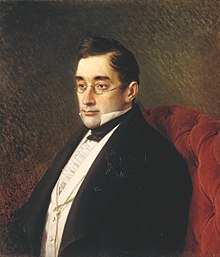Alexander Griboyedov | |
|---|---|
 Portrait by Ivan Kramskoi | |
| Russian Ambassador to Iran | |
| In office 1828[1]–1829 | |
| Monarch | Nicholas I of Russia |
| Personal details | |
| Born | Alexander Sergeyevich Griboyedov 4 January 1795 Moscow, Russian Empire |
| Died | 11 February 1829 (aged 34) Tehran, Qajar Iran |
| Resting place | Tbilisi, Georgia |
| Nationality | Russian |
| Spouse | Nino Chavchavadze |
| Alma mater | Imperial Moscow University (1808) |
| Occupation | Diplomat, Playwright, Poet, and Composer |
| Signature | |
Alexander Sergeyevich Griboyedov (Russian: Александр Сергеевич Грибоедов, Aleksandr Sergeevich Griboedov or Griboyedov; 15 January 1795 – 11 February 1829), formerly romanized as Alexander Sergueevich Griboyedoff,[2] was a Russian diplomat, playwright, poet, and composer. His one notable work was the 1823 verse comedy Woe from Wit. He was Russia's ambassador to Qajar Persia, where he and all the embassy staff were massacred by an angry mob as a result of the rampant anti-Russian sentiment that existed through Russia's imposition of the Treaty of Gulistan (1813) and Treaty of Turkmenchay (1828), which had forcefully ratified the Qajar Empire's cession of its northern territories comprising Transcaucasia and parts of the North Caucasus. Griboyedov played a pivotal role in the ratification of the latter treaty.
- ^ Borrero, Mauricio (2009). Russia: A Reference Guide from the Renaissance to the Present. Infobase Publishing. p. 169. ISBN 978-0816074754.
- ^ "Griboyedoff, Alexander Sergueevich" in the Encyclopædia Britannica, 9th ed., Vol. XI 1880.